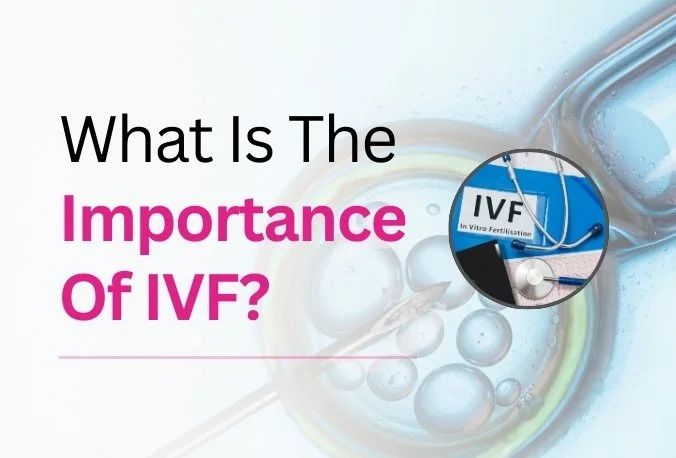What is the importance of IVF?
– Published on 18 April 2024

In vitro fertilization (IVF) is a medical procedure whereby an egg is fertilized by sperm outside of the human body, specifically in a laboratory setting. This technique is often seen as a beacon of hope for couples struggling with infertility, as it can significantly increase their chances of conceiving a child.
The history of IVF dates back to the late 1970s, with the birth of Louise Brown, the first “test-tube baby,” in 1978, marking a pivotal moment in reproductive medicine. Since then, the field has seen rapid advancements, evolving from a revolutionary, yet controversial, procedure into a mainstream fertility treatment.
Infertility has become an increasingly common challenge for couples worldwide, often attributed to factors such as delayed family planning, lifestyle changes, and environmental influences. With this rise in infertility, IVF has become more crucial than ever, offering hope to millions who dream of starting or growing their families.
Understanding Infertility
Infertility is defined as the inability to conceive a child after one year of regular, unprotected sexual intercourse. For women aged 35 and older, the timeframe used by doctors to define infertility shortens to six months, acknowledging the effect of age on fertility.
Infertility can be further classified as primary or secondary, depending on whether the individual has never been able to conceive or has experienced one or more successful pregnancies.
There are various reasons why couples may struggle with infertility. In 20% of cases, a specific cause cannot be identified even after a thorough medical evaluation. However, some factors that may contribute to infertility include hormonal imbalances, structural abnormalities, genetic issues, and lifestyle factors such as smoking, alcohol consumption, and excessive stress.
The prevalence of infertility affects approximately 1 in 7 couples globally, making it a pressing health issue with vast emotional and psychological impacts. This struggle not only affects the physical aspects of health but also carries a significant emotional toll, leading to feelings of frustration, sadness, and inadequacy.
The journey through infertility and its treatments can be draining for individuals and couples alike, often creating stress that can further complicate their path to parenthood.
Read more-Who needs ivf to conceive ?
Overcoming Infertility Causes with IVF
In-Vitro Fertilisation (IVF) is a revolutionary medical procedure that offers hope to those facing infertility issues that once seemed insurmountable. By allowing fertilization to take place outside the body, IVF circumvents problems like blocked fallopian tubes, a common barrier preventing the egg and sperm from meeting.
In cases of low sperm count or quality, IVF can incorporate Intracytoplasmic Sperm Injection (ICSI) where a single sperm is injected directly into an egg, significantly increasing the chances of fertilization.
IVF Success Rates
The success rates of IVF treatments have steadily improved over the years, offering encouragement to many aspiring parents. While success rates can vary based on factors such as age, the cause of infertility, and the specific techniques used, the average live birth rate per IVF cycle hovers around 50-60% for women under the age of 40. This statistic underscores IVF as a substantial option, providing a real possibility for those struggling to conceive to start a family.
Struggling with infertility? Let Dr. Samidha Dalvi-Amale, an experienced IVF specialist at Pune IVF, guide you through IVF treatment and turn your dream of parenthood into reality.
Steps Towards Action
Even with its widespread use, there remains a need to demystify the process of IVF and educate the public on infertility issues. There should be concerted efforts to develop educational initiatives that provide accurate information and break down the complex medical language into terms that are easily understandable by the general population.
These programs could cover the biological aspects of infertility, the emotional challenges faced by those affected, and the various medical treatments available, with an emphasis on the role and realities of IVF.
Additionally, it is essential to promote positive narratives surrounding IVF and fertility treatments in general, as the stigma and misinformation surrounding these topics can be a barrier for many seeking assistance.
Conclusion
The constantly evolving field of reproductive medicine has made great strides in helping couples achieve their dream of having a child through IVF. As more couples turn to assisted reproductive technologies like IVF, it is crucial to continue advocating for accurate information and open discussions about infertility and fertility treatments.
With increased awareness, support, and access to care, IVF can continue to make a significant impact in the lives of those struggling with infertility. So let us break down barriers and promote understanding on this important topic, as every individual deserves the chance to create their own family.

By Dr Samidha Dalvi-Amale
IVF and Fertility specialist Medical Director- Pune IVF
